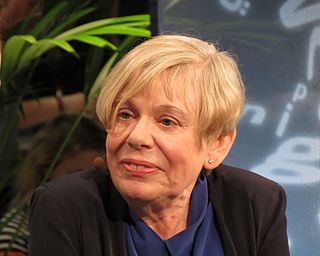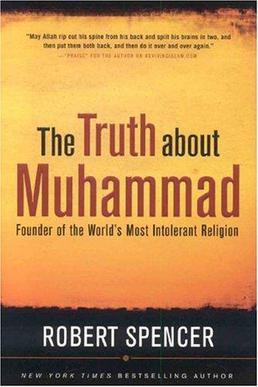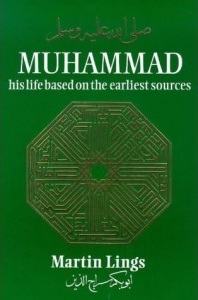
Muhammad was an Arab religious, social, and political leader and the founder of Islam. According to Islamic doctrine, he was a prophet divinely inspired to preach and confirm the monotheistic teachings of Adam, Abraham, Moses, Jesus, and other prophets. He is believed to be the Seal of the Prophets within Islam. Muhammad united Arabia into a single Muslim polity, with the Quran as well as his teachings and practices forming the basis of Islamic religious belief.

Ibn Warraq is the pen name of an anonymous author critical of Islam. He is the founder of the Institute for the Secularisation of Islamic Society and used to be a senior research fellow at the Center for Inquiry, focusing on Quranic criticism. Warraq is the vice-president of the World Encounter Institute.

Karen Armstrong is a British author and commentator of Irish Catholic descent known for her books on comparative religion. A former Roman Catholic religious sister, she went from a conservative to a more liberal and mystical Christian faith. She attended St Anne's College, Oxford, while in the convent and majored in English. She left the convent in 1969. Her work focuses on commonalities of the major religions, such as the importance of compassion and the Golden Rule.
Victor Gollancz Ltd was a major British book publishing house of the twentieth century and continues to publish science fiction and fantasy titles as an imprint of Orion Publishing Group.
Criticism of Islam is questioning or challenging the beliefs, practices, and doctrines of Islam. Criticism of Islam can take many forms, including academic critiques, political criticism, and personal opinions.

The Battle of Uhud was a major engagement between early Muslims and the Quraysh during the Muslim-Quraysh War. The battle was fought in a valley north of Mount Uhud near Medina on Saturday, 23 March 625 AD,

Lovecraft: A Biography is a 1975 biography of the writer H. P. Lovecraft by science-fiction writer L. Sprague de Camp, first published in hardcover by Doubleday in February 1975.

Abdul Majid Daryabadi was an Islamic scholar, philosopher, writer, critic, researcher, journalist and exegete of the Quran in Indian subcontinent in the 20th century. He was as one of the most influential Indian Muslim scholar and was much concerned with modernism and comparative religions and orientalism in India. In his early life, he became sceptical of religion and called himself a "rationalist". For almost nine years, he remained away from religion but repented and became a devout Muslim. He was actively associated with the Khilafat Movement, Royal Asiatic Society, Aligarh Muslim University, Nadwatul Ulama, Darul Musannefin Shibli Academy and several other leading Islamic and literary organisations. He was disciple of Ashraf Ali Thanwi and Hussain Ahmed Madani.

The first pilgrimage or Umrah of Dhu'l-Qada was the first pilgrimage that the Islamic prophet Muhammad and the Muslims made after the Migration to Medina. It took place on the morning of the fourth day of Dhu al-Qi'dah 7 AH, after the Treaty of Hudaybiyyah 6 AH. The entire event was three days long.

Ar-Raheeq Al-Makhtum, is a seerah book, or biography of the Prophet, which was written by Safiur Rahman Mubarakpuri. This book was awarded first prize by the Muslim World League in a worldwide competition on the biography of the Prophet held in Mecca in 1979.

The Truth About Muhammad: Founder of the World's Most Intolerant Religion is a biography by American anti-Muslim author Robert B. Spencer about the Islamic prophet Muhammad. Written from a critical perspective towards its subject, this book examines the life of Muhammad in ten chapters based on the sources provided by his early biographers, together with the Quran and the hadith, while also challenging their historical authenticity.

Criticism of Muhammad has existed since the 7th century AD, when Muhammad was decried by his non-Muslim Arab contemporaries for preaching monotheism, and by the Jewish tribes of Arabia for what they claimed were unwarranted appropriation of Biblical narratives and figures and vituperation of the Jewish faith. For these reasons, medieval Jewish writers commonly referred to him by the derogatory nickname ha-Meshuggah.
Muhammad: A Prophet For Our Time is a 2006 non-fiction book by the British writer Karen Armstrong. It is part of the "Eminent Lives" series, which are short biographies of famous people by well-known writers. It is Armstrong's second biography of Muhammad. Her first biography Muhammad: a Biography of the Prophet earned her the Muslim Public Affairs Council Media Award. Muhammad: A Prophet For Our Time is a short biography that shows how most Muslims understand Muhammad and their faith. In the book, Armstrong depicts Muhammad as both a mystic and a wise political and social reformer.

The permissibility of depictions of Muhammad in Islam has been a contentious issue. Oral and written descriptions of Muhammad are readily accepted by all traditions of Islam, but there is disagreement about visual depictions. The Quran does not explicitly or implicitly forbid images of Muhammad. The ahadith present an ambiguous picture, but there are a few that have explicitly prohibited Muslims from creating visual depictions of human figures. It is agreed on all sides that there is no authentic visual tradition as to the appearance of Muhammad, although there are early legends of portraits of him, and written physical descriptions whose authenticity is often accepted.
Abu Talib ibn Abd al-Muttalib was the leader of Banu Hashim, a clan of the Qurayshi tribe of Mecca in the Hejazi region of the Arabian Peninsula. He being the brother of Abdullah, the father of the Islamic Prophet Muhammad, was his uncle and father of Ali. After the death of his father Abd al-Muttalib ibn Hashim ibn Abd Manaf, he inherited this position as tribal chieftain, and the offices of Siqaya and Rifada. He was well-respected in Mecca.

Jonathan Andrew Cleveland Brown is an American scholar of Islamic studies. Since 2012, he has served as an associate professor at Georgetown University's Edmund A. Walsh School of Foreign Service. He holds the Alwaleed bin Talal Chair of Islamic Civilization at Georgetown University.

Muhammad: His Life Based on the Earliest Sources is a 1983 biography of the Islamic prophet Muhammad by Martin Lings.
The Muslim–Quraysh War was a six-year military and religious war in the Arabian Peninsula between the early Muslims led by Muhammad on one side and the Arab pagan Quraysh tribe on the other. The war started in March 624 with the Battle of Badr, and concluded with the Conquest of Mecca.











